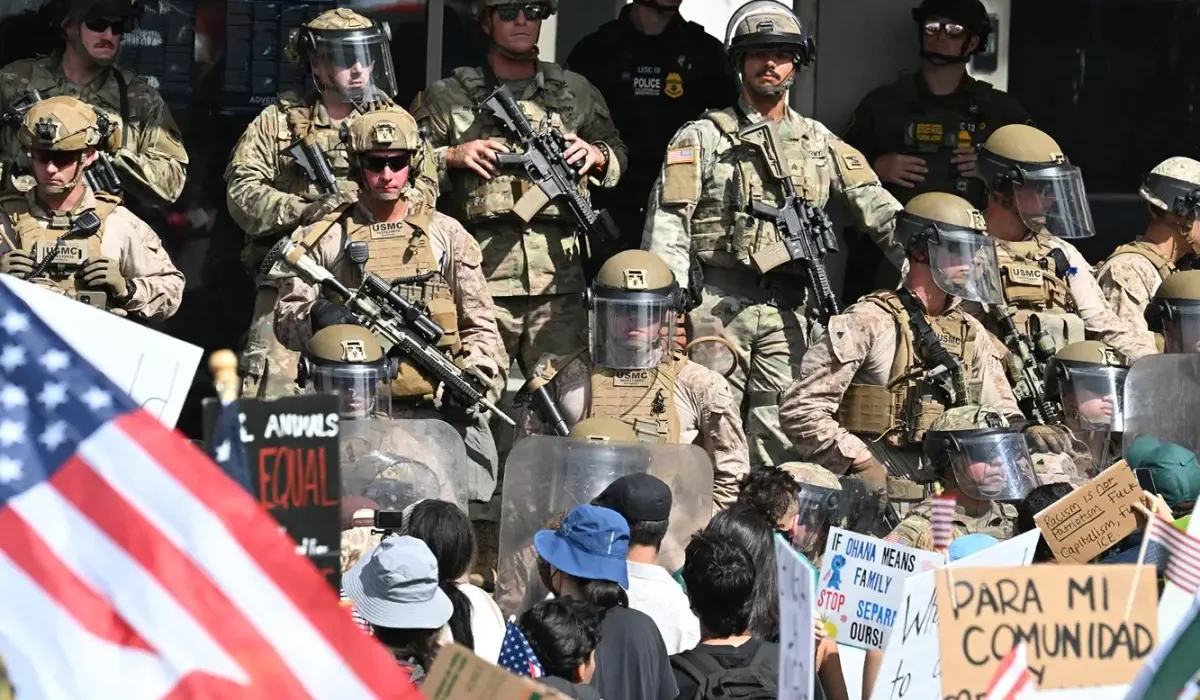
Commands, Conscience, and the Fourth of July: How US Soldiers Grapple with Authoritarian Threats in 2025.
Posted in :
On July 4, 2025, U.S. service members find themselves questioning whether following orders under Trump’s authoritarian leadership aligns with their oath to the Constitution. Campaigns like About Face’s “Right to Refuse” seek to protect troops from unlawful orders. This Independence Day, duty and democracy are on a collision course.
As fears grow over the use of the military in domestic affairs during Donald Trump’s renewed presidency, American service members confront dilemmas around obedience, ethics, and protest. This blog explores the rise in internal resistance, the birth of the ‘Right to Refuse’ campaign, and the personal struggles of soldiers navigating between duty and conscience.
Picture this: It’s July 4th, a day celebrating independence, but instead of fireworks and backyard BBQs, some US soldiers spend the day wrestling with what it means to be free under orders. One Air Force mechanic—let’s call her Kim—finds herself not scanning the skies, but the headlines, wondering what will happen if she’s asked to enforce commands on her neighbors. Will obeying make her a patriot, or a pawn? In 2025, the line is blurrier than ever, and that’s what we’re diving into today.
1. Independence Day with a Twist: When Service and Patriotism Collide
For many Americans, the Fourth of July is a day for fireworks, backyard barbecues, and waving flags. But for Kim, an Air Force mechanic, July 4, 2025, feels nothing like a celebration. Instead of grilling burgers, she spends the holiday wrestling with a new kind of anxiety—one that comes from the growing possibility of being ordered to act against fellow Americans. “And now we have military in our streets, and that’s not where you’re supposed to see them,” Kim shares, her words reflecting a sentiment that’s spreading through the ranks.
This year’s Independence Day is marked not by parades, but by protest. The About Face veterans campaign 2025 launches its “Right to Refuse” initiative, urging service members to stand up for their oath to the Constitution—even if it means refusing unlawful orders. The campaign is a direct response to the rise in US Military Deployment for domestic law enforcement, a trend that has accelerated since the early 2020s. Veterans and active-duty soldiers alike are asking hard questions about where the line is drawn between defending the nation and being used as a tool for political power.
The unease isn’t just about the optics of Humvees rolling down Main Street. It’s about the deeper clash between duty and conscience. Legal experts, like George Washington University’s Professor Laura Dickinson, note that the United States has always been cautious about using the military for domestic law enforcement. Trump’s recent deployment of federalized National Guard troops and active-duty Marines to Los Angeles—without initially invoking the Insurrection Act—has broken with decades of precedent. Dickinson calls it “norm busting and very concerning to people in the military.”
The possibility that President Trump could invoke the Insurrection Act to suppress protests is fueling further anxiety. The Act was designed for true insurrections, not for policing Americans exercising their constitutional rights. As Brittany Ramos DeBarros, an Afghanistan veteran and organizing director of About Face, points out, “People in the military understand that there’s probably no less equipped branch of the federal government to do de-escalation work than the Marines.” The rules of engagement for war are not the same as those for law enforcement, and the risk of escalation is real.
Research shows that veterans are mobilizing this Fourth of July, reframing symbols of patriotism through protest actions from within the military itself. The Fourth of July military protest Trump movement is not just about policy—it’s about identity. Service members are reflecting on what it truly means to defend the Constitution when the orders they receive may conflict with the very rights they swore to protect.
“I may not have joined the military out of the most patriotic of reasons, but I still raised my right hand and swore an oath to the Constitution to defend it from all enemies foreign and domestic. But the American people are not the Constitution’s domestic enemies.” – Kim, Air Force mechanic
The surreal image of military patrols on American streets is unsettling for many. It’s a stark contrast to the usual scenes of celebration and unity. Instead, July 4, 2025, is a day when service and patriotism collide, and the meaning of loyalty is being debated not just in the public square, but within the ranks of those sworn to protect the nation.
2. Orders Versus Oaths: The Legal and Ethical Crossroads of Military Obedience
As the Fourth of July unfolds in 2025, a growing number of U.S. service members are voicing deep concerns about the legal and ethical dilemmas they face under President Trump’s administration. The fear of being ordered to participate in actions that may violate the Constitution—especially under the looming threat of the Insurrection Act—has sparked a national conversation about the right to refuse unlawful military orders and the real risks of court-martial for illegal orders.
Air Force mechanic “Kim,” speaking anonymously, captures the anxiety felt by many: “And now we have military in our streets, and that’s not where you’re supposed to see them.” Kim’s unease reflects a broader sentiment among service members who worry about Trump military use against civilians and the possibility of being caught between unlawful presidential directives and their sworn oath to the Constitution.
Legal Ambiguity and the Insurrection Act
The Insurrection Act—a centuries-old law allowing the president to deploy troops domestically—has become a flashpoint. While Trump has threatened to invoke it during mass protests, legal scholars warn that its use against constitutionally protected demonstrations could be a grave misuse. Past court rulings have struck down presidential overreach in deploying the military for domestic law enforcement, but the law remains ambiguous, leaving troops vulnerable.
George Washington University law professor Laura Dickinson highlights the precarious position service members face:
“The United States federal government has been very cautious about using the federal military domestically for law enforcement purposes. It’s norm busting and very concerning to people in the military.”
Dickinson warns that military personnel could face a “legal trap”—court-martial for refusing to follow illegal orders, or prosecution for carrying them out. This uncertainty fuels Trump Insurrection Act military fears and intensifies the debate over military resistance to illegal orders.
The Right to Refuse: Momentum and Advocacy
In response, advocacy groups like About Face are launching campaigns such as the “Right to Refuse,” pushing for explicit legal protections for those who decline to obey unlawful or immoral commands. Veterans and activists are lobbying Congress to codify the right to refuse unlawful military orders, arguing that current laws do not clearly shield service members from punishment if they resist questionable directives.
- Legal experts argue that service members lack clear protections when faced with potentially illegal orders.
- Activists are urging Congress to pass legislation safeguarding dissenting soldiers.
Brittany Ramos DeBarros, an Afghanistan veteran, points out that Marines and other troops are not trained for domestic policing. “There’s probably no less equipped branch of the federal government to do de-escalation work than the Marines,” she notes, emphasizing the dangers of using military tactics on American streets.
The stakes are high. Reports from Trump’s previous term reveal discussions about using force against civilians, with the president allegedly asking, “Can’t you just shoot them, just shoot them in the legs or something?” Such statements, combined with the threat of Trump military use against civilians, have left many in uniform questioning where their duty truly lies.
As Kim puts it, “I may not have joined the military out of the most patriotic of reasons, but I still raised my right hand and swore an oath to the Constitution to defend it from all enemies foreign and domestic. But the American people are not the Constitution’s domestic enemies.”
3. Warriors or Police? Why Military Tactics and Policing Civilians Don’t Mix
The line between military service and law enforcement has become increasingly blurred in 2025, raising urgent questions about Trump military use against civilians and the ethics of Military Policing Civilians. As President Trump deployed Marines and National Guard troops to cities like Los Angeles and Florida in response to protests, many service members and veterans voiced deep concerns about the risks of using Military Tactics in situations that demand de-escalation and restraint.
Veterans, including Afghanistan veteran Brittany Ramos DeBarros, have been at the forefront of this debate. DeBarros, now an organizer with the About Face veterans’ group, highlights a fundamental problem: the military is simply not trained for policing civilians. She explains,
“People in the military understand that there’s probably no less equipped branch of the federal government to do de-escalation work than the Marines.”
Marines are trained for combat, not crowd control, and their rules of engagement are designed for warfare, not for protecting constitutional rights during protests.
This dangerous mismatch has real-world consequences. Reports surfaced that President Trump, during the height of the Black Lives Matter protests, considered using live fire on demonstrators. According to the New York Times, Trump asked, “Can’t you just shoot them, just shoot them in the legs or something?” Such comments have alarmed both current and former service members, who see a stark contrast between the demands of combat and the responsibilities of law enforcement. The idea of Trump military use against civilians is not just a theoretical concern—it’s a lived reality for those ordered to patrol American streets.
Research shows that applying Military Tactics to civilian protest situations is fraught with ethical and practical dangers. The military’s approach to threats is fundamentally different from that of police officers, who are trained to de-escalate and protect the public. When soldiers are asked to police civilians, the risk of escalation and violence increases dramatically. This is why so many veterans, including those in the About Face campaign, are demanding clear legal protections for service members who refuse unlawful or unethical orders.
The legal landscape is also shifting. George Washington University law professor Laura Dickinson notes that military members now face a troubling dilemma: risk court-martial for refusing illegal orders, or prosecution for carrying them out. The federal government has historically been cautious about using the military for domestic law enforcement, but recent deployments have shattered these norms. Dickinson calls this “norm busting and very concerning to people in the military.”
The About Face group’s “Right to Refuse” campaign, launched on the Fourth of July, is pushing Congress to pass laws that protect service members who stand up to Authoritarianism and American military ethics. Many, like Air Force mechanic “Kim,” joined the military for stability, not to be used as tools of repression. As Kim puts it, “I still raised my right hand and swore an oath to the Constitution to defend it from all enemies foreign and domestic. But the American people are not the Constitution’s domestic enemies.”
As US soldiers oppose Trump dictatorship and question their roles, the debate over Military Policing Civilians is more urgent than ever. The stakes are high—not just for the military, but for American democracy itself.
Wild Card: Flip the Script – What if Soldiers Led the Fourth of July Parade for Peace?
Imagine a Fourth of July unlike any other—a parade where, instead of armored vehicles and military displays of force, a military band leads the way, holding banners that read “Defend the Constitution, Not Authoritarianism.” In this vision, the streets are filled not with the thunder of boots, but with the steady beat of drums and the hopeful sound of brass. Soldiers and veterans, some in uniform, march arm-in-arm with civilians, not as enforcers, but as protectors of the very rights the holiday is meant to celebrate. This isn’t just a hypothetical; it’s a scene inspired by real actions from groups like About Face, whose members have been seen linking arms with protestors, standing for peace, and calling for a return to the military’s constitutional roots.
This year, the Fourth of July military protest Trump has become a focal point for national debate. Service members across the country are openly questioning what it means to serve when the orders they receive may conflict with their oath to defend the Constitution. As reported by The New Republic, many in uniform are spending the holiday demanding clarity and protection from being forced to carry out potentially unlawful directives. The About Face veterans campaign 2025, for example, is pushing for the “Right to Refuse”—a movement advocating for legal protections for those who decline to follow orders they believe are illegal or immoral.
The symbolism of military service is shifting. Where once the image of a soldier in a parade might have evoked power and discipline, today it can also represent conscience and courage. Air Force mechanic “Kim” put it simply: “I still raised my right hand and swore an oath to the Constitution to defend it from all enemies foreign and domestic. But the American people are not the Constitution’s domestic enemies.” Her words echo the growing sentiment among service members who see their duty as first and foremost to the Constitution, not to any political leader.
Recent events have only heightened these concerns. President Trump’s deployment of federal troops to Los Angeles in June 2025, amid protests over ICE raids, sparked legal challenges and widespread unease within the military. Experts like George Washington University law professor Laura Dickinson note that such actions break with long-standing norms and force service members into difficult positions—caught between the risk of court-martial for refusing illegal orders and prosecution for following them. The threat of invoking the Insurrection Act to suppress protests has only intensified the debate.
Yet, as research shows, these tensions are also giving rise to a new form of patriotism—one that places the defense of constitutional rights above blind obedience. About Face’s public-facing activism, including peaceful marches and calls for legislative reform, is catching the attention of both Congress and the public. Their message is clear: true service means standing up for the principles that define American democracy.
As the Fourth of July unfolds in 2025, the possibility of soldiers leading a parade for peace is more than just a thought experiment. It’s a reflection of a broader movement within the military—one that seeks to redefine what it means to serve, and to ensure that, above all, service members defend the Constitution.
TL;DR: Many US service members now confront a harsh reality: obeying orders may clash with defending what they signed up to protect. Grassroots military campaigns, including the About Face veterans’ movement, highlight escalating unease on Independence Day 2025. The stakes have never been higher for the US’s civil-military balance.
TrumpInsurrectionActMilitaryFears, RightToRefuseUnlawfulMilitaryOrders, USSoldiersOpposeTrumpDictatorship, AuthoritarianismAndAmericanMilitaryEthics, TrumpMilitaryUseAgainstCivilians, AboutFaceVeteransCampaign2025, MilitaryResistanceToIllegalOrders, FourthOfJulyMilitaryProtestTrump, ServiceMembersDefendConstitution, TrumpMartialLawThreat2025,FourthofJulymilitaryprotest Trump, rightto refusemilitaryorders, TrumpInsurrectionActfears, AboutFaceveteranscampaign, militarypolicingcivilians
#RightToRefuse, #DefendTheConstitution, #MilitaryEthics, #NoToAuthoritarianism, #VeteransSpeakOut, #FourthOfJulyProtest, #AboutFaceCampaign, #StopIllegalOrders,#MilitaryResistance, #RightToRefuse, #AboutFaceVeterans, #TrumpInsurrectionAct, #USMilitaryProtest, #ConstitutionalOath, #FourthOfJuly2025, #AuthoritarianismAlert

